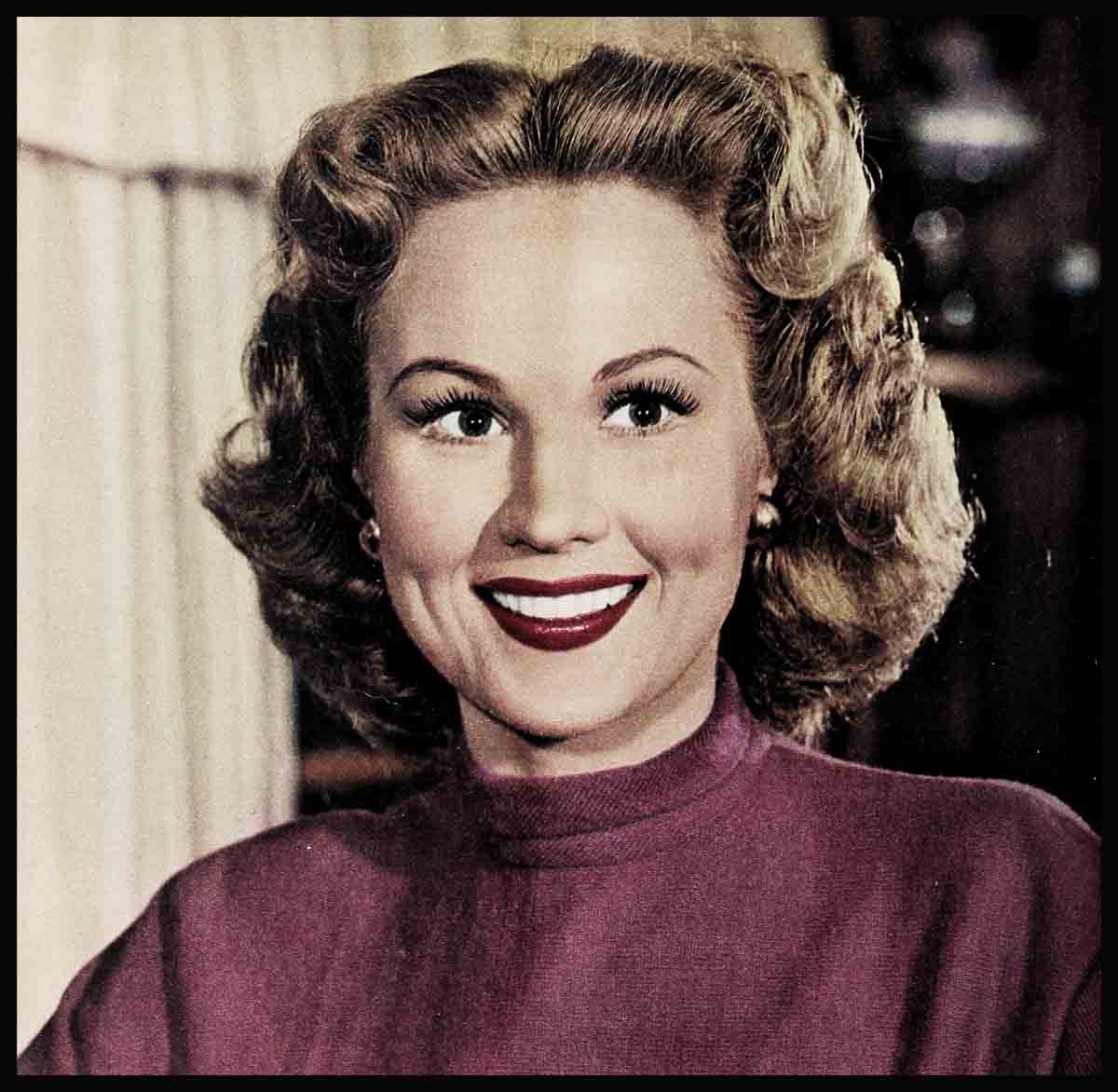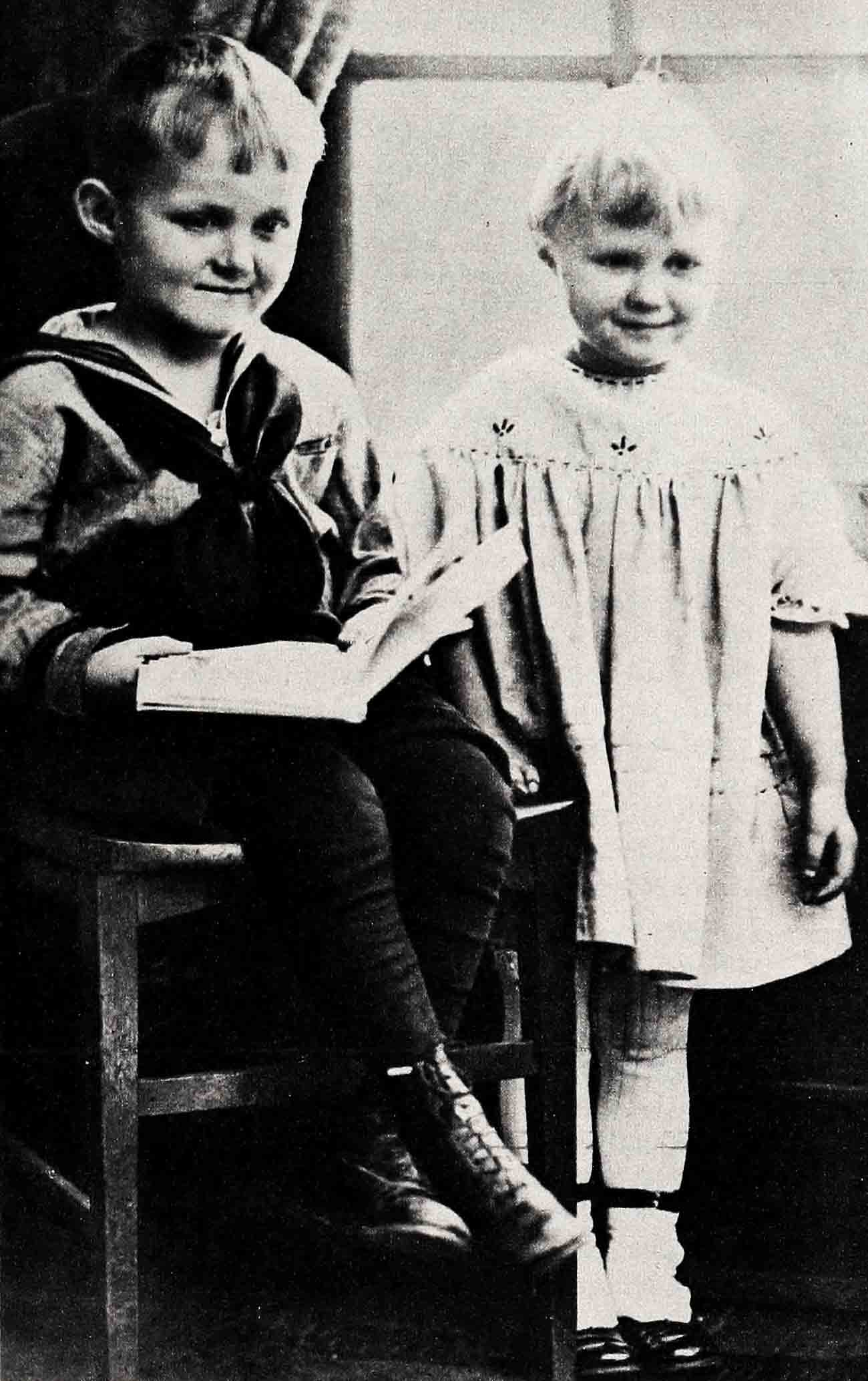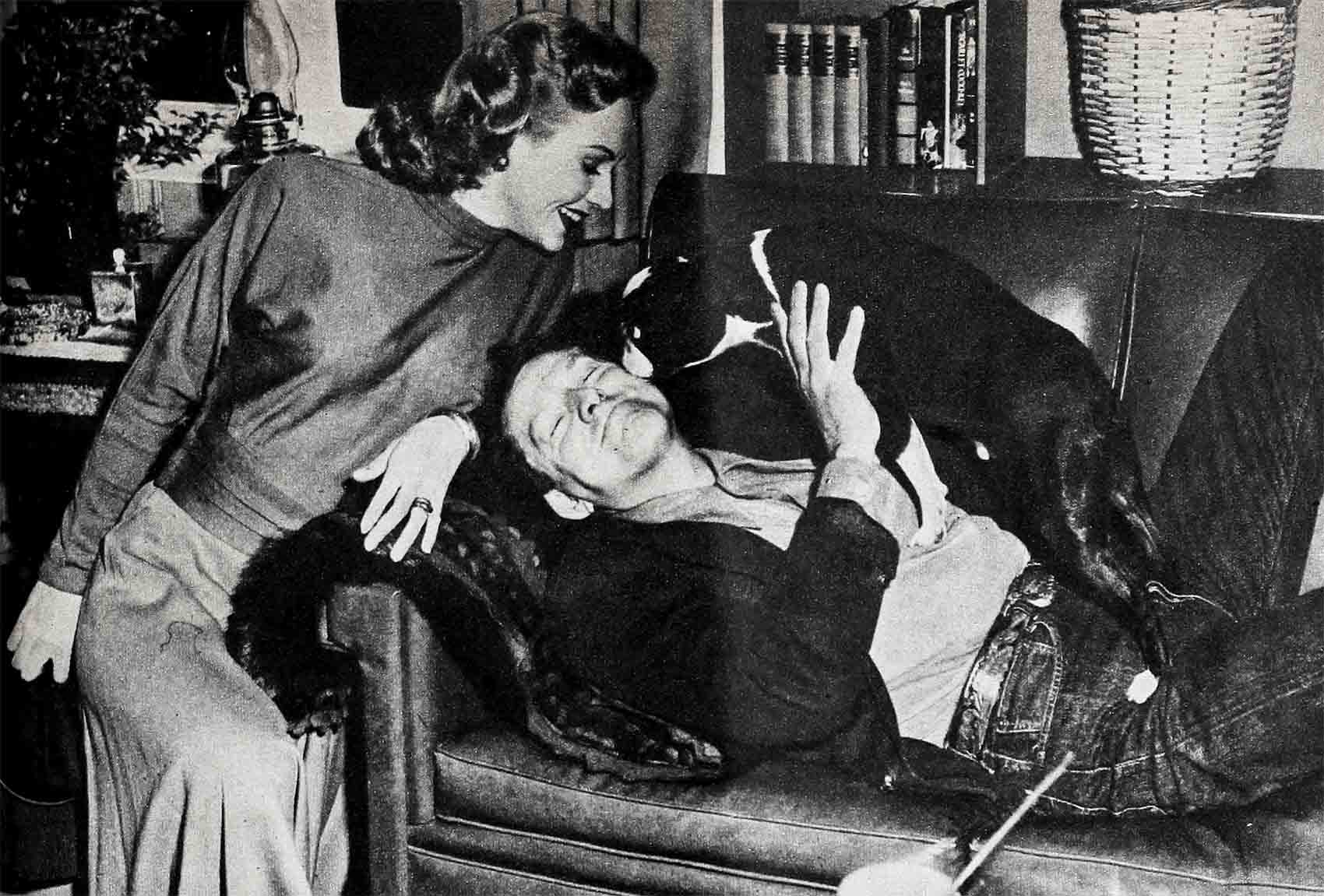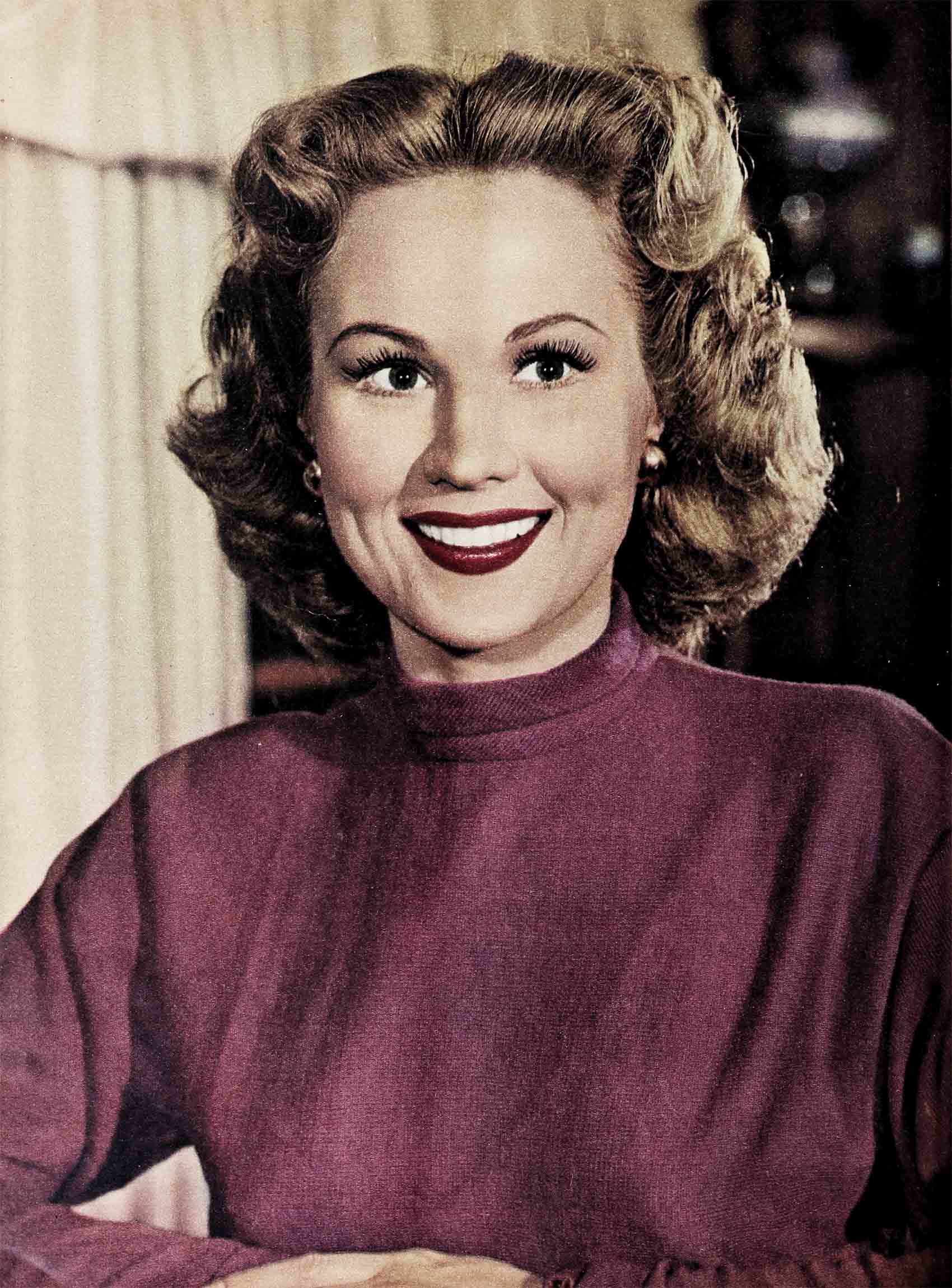
The Transformation Of Sis Jones—Virginia Mayo
They brought the clippings in from the press department to prove the reviews to me.
Those rave notices weren’t a dream. I actually read, “Because of her portrayal of Cagney’s wife in ‘White Heat,’ beautiful and charming Virginia Mayo undoubtedly will be among the Academy contenders next spring.”
“Beautiful and charming!” Were they talking about me, Sis Jones of St. Louis, Missouri who, at the age of six, had gone around with her head shaved and her heart heavy? My head was shaved because most of my hair had fallen out after an attack of scarlet fever. It took more than a year for my hair to grow back again. But this misfortune became a blessing when my new hair was more beautiful and more luxuriant than before.
As for my heart, that really suffered at that time. I was in love. He was a wonderful guy, all of eight, and he was already tall, dark and handsome. I wanted him to flirt with me. He never batted an eyelash at me. He was too busy using his eyes on my best girl friend.
I’m explaining all this because, among my readers, there may be other girls who are now going through that same self-criticism I’ve experienced ever since I was a little girl.
The first time I ever met Michael O’Shea he walked up to me on the set, looked at me and kissed me on the cheek. I gasped and said, “What’s that for?” Mike said, “That’s because you’re the most beautiful girl I’ve ever seen!” I fell in love with him, that instant. Two years ago, last July, we were married. Now, I have a thousand better reasons for being in love with Mike than that compliment. But then it meant the world to me. One word of praise and I can be turned into a devoted slave. One mean word and I can really be struck dumb. Or, at least, I could be until just recently. I was never able to defend myself. I couldn’t fight back. I would just shut up and sort of die inside.
How did I get that way, in the first place, and how did I get over it, finally?
I grew up pretty much of a tomboy, probably aping my brother, Lea, who was two years older than I. My dad was an advertising solicitor for the St. Louis GlobeDemocrat and he had quite a few highbrow leanings. He helped me write my compositions in school. He helped prod and push me through English and history, but the things I got “A’s” in myself were art and biology. The subject I flopped in (because Dad didn’t know a word of it) was French. I flopped when it came to attracting boys. All the way through school the boys who took me to proms were just as dull as I was!

Now all this just proves what an inferiority complex does to you because, looking back, I see that I actually had grounds for feeling quite something. Even before I entered Benton grammar school, I actually knew just what I wanted to do with my life, which is more than lots of people know when they get out of college. From my first conscious moment, I wanted to be a movie actress and I kept after my family to take me to movies. I nagged them so that usually I got to see two movies a week. I kept lists of pictures in the order in which I thought I should see them. One list I marked “must.” The second was “should” and the third was “if possible.” My “must” pictures were the highbrow ones, and to this day my favorite reading is Shakespeare. The “shoulds” were the movies with good performances in them. The “if possibles”’ were the ones designed merely for pleasure.
Putting anything that is designed merely for pleasure into the remote class, I’m now convinced, is another sign of an inferiority complex. When you are happy, you make other people happy. Therefore, they are attracted to you. But when you are unsure of yourself, you don’t dare just have fun. You are as solemn as an owl.
I was definitely as solemn as an owl. By the time I was eight I was attending (after grammar school), the Wientge School of Dramatic Expression. Here I not only learned the rudiments of acting but how to dance and sing, construct stage sets, make costumes and do general designing. The dramatic school was owned and directed by Mrs. Alice Jones Wientge, who also is my aunt. Because of this she was more critical of my work than of the other pupils, for which I now am grateful.
I had my first professional engagement when I was only eight. The Stratford-on-Avon players came to St. Louis with their Shakespearean repertory company and when they did “A Midsummer Night’s Dream,” I played an elf.
I kept up with my ballet studies all through high school, however, and did well enough with them, for when I was sixteen, I answered the call for dancers for St. Louis’ famous “Muni” (for Municipal) opera. I made my own costume for the tryout. It was of turquoise blue satin with a wonderful pleated skirt that showed my legs, and it fitted beautifully. Maybe the dress did it. Anyway, I was hired.

There I got my first glimpse into a world,that was gay, Bohemian, and still very hard-working. After one night’s performance, I knew I hadn’t been wrong in my decision to be an actress. I was still aiming at Hollywood, but I realized at once that any part of show business was still to bring joy to me. When the brief opera season was over and I got a chance to ‘dance at a night club, I was more released and unafraid than I had ever been in my life.
But I was still Sis Jones, there, in that St. Louis night club, and while I was beginning to have lots of dates, they still weren’t with the type of boys I desired. My final year at Soldan High arrived, that year when they rated me “pretty, but dumb,” and rated my girl friend (still going with that tall, dark and handsome male I wanted), as having “loads of personality.” Just before graduation, I got a chance to be in a vaudeville act with Andy Mayo. Andy was a guy with a horse named Pansy.
I not only took that chance a couple of weeks after I got my diploma, but I also took Andy’s name for my professional surname.
For four years, Pansy and I toured all kinds of towns and all kinds of theaters, eating in beaneries, traveling on dirty trains. I began to comprehend, dimly, that it wasn’t only St. Louis that had its right side and wrong side of the tracks. I came to realize, vaguely, that people were people everywhere, some nice, some horrid, some generous, some grasping. In the theaters I was Virginia Mayo, who, papers and audiences seemed to think, was pretty bright. Yet, off stage, if I’d get invited to some small city party or dinner, I was still Sis Jones, scared and not believing in myself.
We finally reached Broadway. Pansy and I were featured in “Banjo Eyes,” Eddie Cantor’s show, and then, later, at Billy Rose’s Diamond Horseshoe. And that was the order of our importance, first Pansy, then yours insecurely. It was, by this time, the year 1943. One night Billy Rose came back to my dressing room and told me that Samuel Goldwyn had caught the show and wanted to interview me the next day.
Sis Jones was so thrilled she could hardly speak. It turned out I didn’t need to. At the Waldorf, Goldwyn asked me how I’d like to be in pictures. I gasped that I’d like it very much. Two weeks later, my mother and I were in Hollywood. I wasn’t so naive that I expected to be a Greer Garson overnight. But it shocked me when they set me studying for weeks and then ended by saying I’d be a Goldwyn girl, which is Hollywoodese for chorus girl.

I said, “Yes, Mr. Goldwyn,” and went into “Up in Arms” but to Sis Jones I said, “I told you so. You’re not up to the Hollywood standard. You’ll never get ahead.” My next picture was “Jack London.” It was a good picture and I wasn’t bad in it. But you probably remember that the star was Michael O’Shea. That’s when I met Mike, bless him. We didn’t let ourselves know for a long time that we had fallen in love. I just couldn’t get anything so wonderful through my bewildered head. I only knew that when Mike was around I was very happy.
Instead of cheering me up, when I went into “The Princess and the Pirate” with Bob Hope and then “Wonder Man” with Danny Kaye, it shattered me. No two men could possibly build up an inferiority complex quicker. Both of them are so clever, they glitter. In scenes with them, I felt less important than a gnat.
Danny and I stayed together through four pictures, and they always were referred to as “Danny Kaye pictures.”
I honestly think I would have packed up and gone back to Pansy, the horse, if it hadn’t been for Mike. But Mike was full of laughter, full of assurance. He was the only man I ever loved. When he asked me to marry him, shy Sis Jones was the happiest girl in Hollywood! For Mike loved me not just because I was a blonde, or wore my clothes well. Mike loved little Sis Jones of St. Louis.
That was the beginning of my cure. Because somebody was loving me, just for me, then maybe I could make other people like me on that basis. Instantly I came to that conclusion, I began to laugh and have fun as I never had.
I went into “The Best Years of Our Lives” next, with Dana Andrews, Teresa Wright, Myrna Loy, Freddie March. When the notices came out and conceded that I had held my own among such stars, I was in sixth heaven, moving into seventh heaven on July 7, 1947, when Mike and I were married.
I thought that seventh heaven was the top. But I discovered an eighth heaven. Warners signed me to a long-term contract and gave me a variety of good roles. No longer was I just a pretty stooge for comics.
When I brought home the reviews on my performance in “White Heat” and read them to Mike, emphasizing phrases like “great dramatic power,” “exciting performance” and “Academy Award contender,” his comment was, “Sweetheart, why are you so surprised? I’ve been telling you those things for years.” He kissed me tenderly and added. “Now get your levis on. I’ve got the horses saddled and we’re going riding.”
We have the best times together, Mike and I. We live on a ranch in the Valley, in a simple house with a stable for horses out back.
Someday I hope we have to add on a nursery wing, and if ever I have a daughter, I won’t tell her to “Be Herself.” I’ll say to her, “Find Yourself. Then be it—and be happy.”
—BY VIRGINIA MAYO
It is a quote. PHOTOPLAY MAGAZINE MAY 1950





No Comments